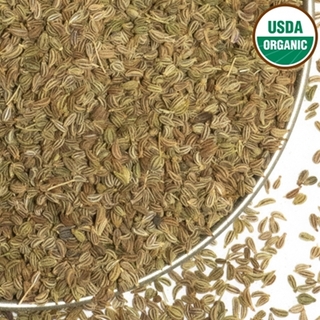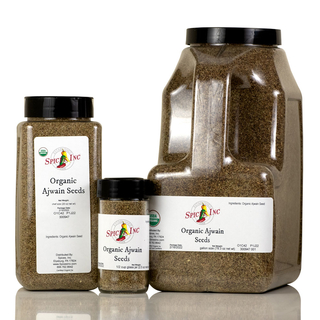Organic Ajwain Seeds




Organic Ajwain Seeds
Ajwain seed, Trachysoermum ammi, pronounced "aj'o-wen", is a member of the Apiaceae family (commonly called the carrot, celery or parsley family) and is related to anise, asafoetida, caraway, carrot, celery, chervil, coriander, cumin, dill, fennel, parsley and parsnip. While some believe they're native to southern India, botanists have found the greatest genetic variety in the Eastern Mediterranean which means it is indigenous to that region.
The grayish-green seeds are curved and striped (resembling caraway or cumin seeds in appearance), often with a fine silk stalk still attached.
Ajwain has 2.5% to 5% essential oil, primarily phenols-thymol (35% to 60%) and carvacrol (about 11%).
Called ajwan, kamun al-mulaki or taleb el koub (Arabic), yin dou eng hui xiang (Mandarin), nanava (Farsi), ajowan (French, German, Japanese, Portuguese and Spanish) and ajwain or carom omum (Hindi). Also called Bishop's Weed, Carom and Ethiopian Cumin. Alternative spellings include Ajowan and Ajwan.
History of Ajwain
In ancient Egypt, ajwain seeds were used regularly as a medicine and as a culinary spice. In traditional Ayurvedic medicine (one of the world's oldest holistic "whole-body" healing systems), ajwain seeds have a long history treating asthma, persistent coughs, flatulence and indigestion. They were also prescribed as an antiseptic and a germicide. Ajwain is called for (as part of a combination with other items) in both Pagan and Wiccan rituals as a talismanic spice (an object thought to contain certain magical properties for the possessor that either draws good luck or offers protection from potential evil or harm), typically kept in a pouch or juju bag.
It was introduced to central Europe in the middle of the 16th century.
Cultivation
Ajwain is an aromatic herbaceous plant that reaches a height of 1-3 feet; with numerous branched leafy stems with leaves that are pinnately divided (arrangement of feather-like or multi-divided features arising from both sides of the branch). It blooms with red flowers which mature into small oval fruits that have a rough surface with numerous short points.
Ajwain is commercially grown in Afghanistan, Egypt, India, Iran and Pakistan.
Our organic ajwain is grown in India.
When and Where to Use
Ajwain is typically found in Asian, Ethiopian, North Indian, Iranian and Pakistani cuisines and pairs well with starchy foods, especially ciabatta (long oblong, flat shaped Italian bread with a soft interior and a lightly crunchy crust), flat breads (such as paratha), green beans, legumes, and root vegetables. They're quite popular in North Indian (especially in Gujarat and Punjab) vegetarian dishes. When fired in butter or oil, they release a thyme-like fragrance. Due to their overpowering flavor, whole seeds are not typically used early in the cooking process, although they do well in some breads.
Good with fish (especially when used with garlic and lemon juice) and recipes using chickpea flour. Ajwain is frequently used in bean dishes, as it relieves gas, similar to epazote, and makes starchy foods and meats easier to digest.
Ajwain pairs well with fish curries, lentil stews, nuts, pastries and bitter vegetables.
Works well in combination with cardamom, cinnamon, cumin, fennel seed, ground cloves, garlic, pepper and turmeric.
The seeds are generally crushed and added to dishes during the final stage of cooking. Be sure to use sparingly as its bold flavor can easily make a dish bitter. When cooked, the flavor mellows similar to oregano or thyme.
Because of the high oil content in the seeds, they quickly lose their flavor once ground - so grind only what you need for any given recipe.
Flavor Profile
The fragrance is strong, with thyme and cumin undertones and the taste is hot with a bit of an initial kick that mellows a bit after.
The aroma grows stronger when the seeds are first ground or when fried in oil or butter.
Substitutes
Ajwain can be used in place of cumin for a surprisingly different flavor and substituted for thyme when we are looking for a more robust thyme flavor.
Read More
Flavor Characteristics of Spices
Most Popular Spices by Cuisine
Indian Spices and Seasonings
Exotic Spices
Nutrition Facts
Serving Size1 tsp
Amount Per Serving
Calories7
% Daily Value*
Total Fat1g1%
Saturated Fat0g0%
Trans Fat0g
Polyunsaturated Fat0g
Monounsaturated Fat0g
Cholesterol0mg0%
Sodium0.2mg0%
Total Carbohydrate1.0g0%
Dietary Fiber0.9g3%
Total Sugars0.0g
Added Sugars0g0%
Sugar Alcohol0.0g
Protein0.4g0%
Vitamin D0mcg0%
Calcium0mg0%
Iron0mg0%
Potassium0mg0%
*The % Daily Value (DV) tells you how much a nutrient in a serving of food contributes to a daily diet. 2,000 calories a day is used for general nutrition advice. These values were calculated and therefore are approximate. For more accuracy, testing is advised.
